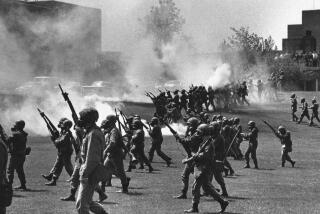SPECIAL REPORT : A Question...
- Share via
It was a picture truly worth a thousand words: a 23-year-old man sitting in a classroom with elementary school children, his 6-foot-9 frame folded into a tiny desk.
Appearing in newspapers and magazines across the country 10 years ago, the photograph summed up the saga of Kevin Ross, a former Creighton University basketball player who had enrolled at a private elementary school because, after four years of college, he could barely read and write.
Seldom has the plight of one athlete had a greater impact on college athletics.
Only months after Ross’ story came to light, NCAA schools adopted legislation basing freshman eligibility on standardized test scores and high school grade-point average--the requirements commonly known as Proposition 48.
And now, nearly a decade later, Ross remains part of the college sports landscape as the plaintiff in a lawsuit that could define the degree to which schools should be responsible for the academic success of the student-athletes they recruit.
A federal appeals court in Chicago ruled last month that Ross can sue Creighton for breach of contract for what Ross claims was the school’s failure to provide him with certain educational opportunities.
Ross claims that Creighton had a contractual obligation to do what was “reasonably necessary” to help him obtain a degree. He alleges that the school breached that contract by not providing him with adequate tutoring and by not allowing him to sit out a season to work on his academics.
According to Ross’ attorney, Marty Schwartz of Chicago, the appeals court ruling marked the first time that a court has upheld a student-athlete’s right to sue a school on such grounds.
Much as the death of Loyola Marymount basketball star Hank Gathers and the litigation stemming from it have heightened schools’ awareness of their medical responsibilities, the Ross case could force schools to look closely at their academic obligations to athletes, said James Gray of Marquette University’s National Sports Law Institute.
Should Ross obtain a judgment or a substantial settlement as a result of his lawsuit, Gray said, colleges will have to be more careful in evaluating the athletes they bring on campus as well as the academic opportunities they make available to them.
The appeals court ruling in the Ross case reversed in part a decision by U.S. District Judge John Nordberg, who had dismissed all claims brought by Ross against Creighton in a suit filed in 1989.
Seeking unspecified damages, Ross had charged Creighton with negligence, including “educational malpractice,” as well as breach of contract.
“I think the Ross case opens a door,” said Timothy Davis, an assistant law professor at Southern Methodist University who teaches contract law and has written extensively on the subject of colleges’ obligations in dealing with athletes, “because of certain language (that appears in the ruling of the appeals court).
“The court seems to be saying, ‘We’re not getting into an evaluation of whether a university’s (educational) services were valid, but we are willing to look at whether a university provided realistic access (to those services).’ ”
It is Davis’ view that, when an athlete signs a letter of intent to attend a school, the parties have
entered into a contract. The athlete has agreed to compete for the school. For its part, the school has agreed to provide certain educational opportunities.
Considering the time demands on student-athletes, Davis says such opportunities must include special tutoring or counseling.
“A school just can’t say (to an athlete), ‘We’ll let you in and provide you with all the things that are part of a college education,’ ” he said. “It must be recognized that different things are going on here.”
While Davis acknowledges recent efforts by the NCAA and Congress, both of which have adopted legislation requiring colleges to disclose their graduation rates for student-athletes, he contends that the “exploitive nature” of the relationship between schools and student-athletes will not change until the courts hold schools accountable for athletes’ academic performance.
“Maybe utilizing the judicial system is another way to exert pressure and bring about change in a meaningful way--in effect, use the courts for prompting change and defining what an athlete’s rights and a school’s obligations are,” he said. “Historically, courts have been a tool for social change. This is another area in which they can play that role.”
The Ross case is expected to have such impact, if for no other reason than the amount of publicity that has been generated by the former player’s story.
A onetime high school basketball star in Kansas City, Kan., Ross enrolled at Creighton on an athletic scholarship in 1978. He played four seasons for the small Jesuit school in Omaha, spending most of his time on the bench.
When he completed his eligibility at Creighton in 1982, he was 32 hours short of obtaining a degree. Faced with limited job opportunities, he enrolled--through arrangements made by Creighton officials--at Westside Preparatory School, the Chicago storefront grammar school founded by noted educator Marva Collins.
Ross’ appearance at Westside Prep caused a national stir. It was revealed that his reading and writing skills were below high school levels and that he had remained eligible at Creighton by taking such courses as ceramics, theory of baseball and first aid.
According to Collins, Ross was so deficient in the fundamentals of grammar that he could not form plurals.
Also damning to Creighton was the revelation that Ross had scored 9 of a possible 36 on the American College Testing (ACT) exam. The average ACT score for students entering Creighton at the time was 23.2.
“Like countless other promising young athletes in the country’s high schools and colleges, he had long managed to hide scholastic shortcomings with the help of victory-minded coaches, teachers and school officials who prized rebounding over reading,” wrote People magazine in an introduction to Ross’ first-person account of his college career in 1983.
Ross spent eight months at Westside Prep, where he improved his reading skills to the level of a high school senior. He also attended Roosevelt University in Chicago until, he said, he ran out of money to pay his tuition.
Then, during the summer of 1987, he snapped.
Tormented, according to his lawsuit, by nightmares concerning his experiences at Creighton and Westside Prep, Ross locked himself in the Chicago hotel room where he was living and began throwing furniture off the eighth-floor balcony onto the street below. The furniture represented Creighton athletic officials, he later said. He surrendered to police only after Collins arrived.
Convicted on a charge of malicious damage to property, Ross was ordered to pay $7,500 in restitution to the hotel.
In a recent interview, he said he stopped just short of committing suicide during the rampage.
“I mean, I messed up a lot of police cars,” he said. “But it’s nothing to brag about, because I hope some other kid doesn’t take the extra step--to jump.”
After the incident, Ross began undergoing treatment for depression.
Two years later, he filed suit against Creighton.
“The thing I’m asked most often,” said Schwartz, Ross’ attorney, “is, ‘How was your kid hurt? Spending four years in college and having an opportunity to get an education, he was better off than the rest of us who couldn’t afford (college) or didn’t go.’
“That may be true in certain cases, but it’s not true for Kevin. He has suffered permanent psychological damage. After spending four years at Creighton, it turns out he would have been better off having not gone at all.”
Creighton’s attorney in the matter, Lynn Dowd of Chicago, declined comment, and the school’s legal counsel, Greg Jahn, did not respond to an interview request.
Creighton has not, however, been totally silent when it comes to Ross.
In a review of his career prepared for the Creighton employee newsletter in 1986--after an appearance by Ross on the “Donahue” television show--the school’s media relations department attempted to counter the former player’s claims. Among its points, the school stated that Ross skipped tutoring sessions and often failed to attend a special remedial reading program that had been set up by the school specifically for him.
“We are weary of being bashed over this,” said Jim Nolan, Creighton’s manager of media relations. “We are not an abuser of athletes. Around the country, 50% to 60% of (college) athletes leave school without degrees. At Creighton, a great percentage graduate and go on to lead productive lives. In this one case, that didn’t happen, and we’ve taken heat for it the last 10 years.”
With the recent federal appeals court ruling, Creighton remains in the fire.
“I do not look at Creighton as though they robbed and beat up a blind old lady,” Schwartz said. “To a certain extent, their motives weren’t all bad. The coaches convinced the admissions people to take a chance on Kevin in the same way they might take a chance on someone with a disability or something.
“The deal broke down when the administration did not follow up and make sure Kevin was getting the necessary tutoring. Also, Kevin asked to be redshirted one year because he wanted to catch up on academics. He was turned down. That’s another point in our favor.
“The common scenario (in college athletics) is the kids don’t want an education. They want to take Mickey Mouse courses, just remain eligible. That is not Kevin’s case. Kevin wanted an education, and he didn’t get it.”
As for Ross, now 33 and working as a handyman at Westside Prep, he said he wants more than a sum of money from Creighton. He said he wants to send a message to all of college sports.
“I’m not just thinking about Kevin Ross. I would like things to get better for everybody.”
More to Read
Go beyond the scoreboard
Get the latest on L.A.'s teams in the daily Sports Report newsletter.
You may occasionally receive promotional content from the Los Angeles Times.










